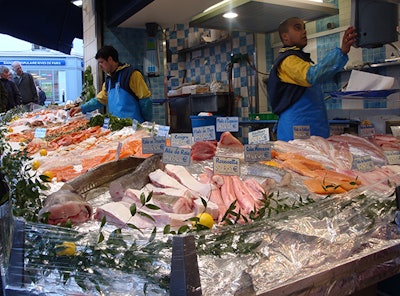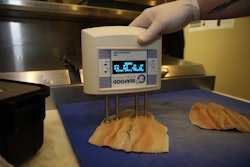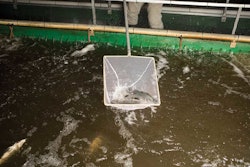
The Presidential Task Force on Illegal, Unreported, and Unregulated (IUU) Fishing and Seafood Fraud, co-chaired by the Departments of Commerce and State, released its action plan, according to the National Oceanic and Atmospheric Administration. This plan articulates the steps that federal agencies will take both domestically and internationally to implement the recommendations the Task Force made in December 2014.
The plan identifies actions that will strengthen enforcement, create and expand partnerships with state and local governments, industry, and non-governmental organizations, and create a risk-based traceability program to track seafood from harvest to entry into U.S. commerce. The plan also highlights ways in which the U.S. will work with foreign partners to strengthen international governance, enhance cooperation, and build capacity to combat IUU fishing and seafood fraud. This includes the Administration’s work to secure historic and enforceable environmental provisions in the Trans-Pacific Partnership, a regional trade agreement that includes countries that together account for approximately one-quarter of global marine catch and global seafood exports.
“The Obama Administration is committed to working to ensure that America’s fishing industry remains the heart and soul of coastal communities across the country,” said U.S. Deputy Secretary of Commerce Bruce Andrews. “The steps the United States has taken to be a leader in environmental stewardship are paying off. However, our nation's fisheries remain threatened by illegal, unreported, and unregulated fishing and seafood fraud, which negatively affects our markets. The Task Force’s new strategic plan will aggressively implement recommendations to guarantee that U.S. fishing fleets remain competitive in the global economy.”
According to NOAA, in 2013, U.S. fishermen landed 9.9 billion pounds of fish and shellfish worth $5.5 billion. Globally, IUU fishing causes significant economic losses, fueling trafficking operations while undermining economic opportunities for U.S. fishermen and others engaged in legal fishing.
“Illegal fishing and seafood fraud affect the American public and people around the world,” said State Department Under Secretary Cathy Novelli. “The plan we are releasing today puts us on course to tackle these complex global challenges, with a new traceability program at its heart. It also gives new urgency to our work towards the strongest possible international tools – including ratification of the Port State Measures Agreement, which will ensure illegal fish cannot reach the global market. We are working closely with our partners in the United States and around the world to bring the full range of resources to the table.”
“The U.S. is a global leader on building sustainable fisheries and the seafood industry is an incredibly important part of our economy,” said Kathryn Sullivan, Ph.D., NOAA administrator. “IUU fishing and seafood fraud undermine economic and environmental sustainability of fisheries and fish stocks in the U.S. and around the world. These actions aim to level the playing field for legitimate fishermen, increase consumer confidence in the sustainability of seafood sold in the U.S., and ensure the vitality of marine fish stocks.”
International actions include:
- Conclude in 2015 the Trans-Pacific Partnership (TPP) negotiations that include commitments to combat IUU fishing and first ever provisions to eliminate harmful fisheries subsidies.
- Work with Congress to enact implementing legislation for the Port State Measures Agreement and receive commitments from at least 14 additional foreign countries to join the Agreement.
- Work with international governments, Regional Fisheries Management. Organizations, and others to advance best practices for: the monitoring, control, and surveillance of international fisheries; the implementation of port State controls; and, compliance monitoring.
Enforcement actions include:
- Implement a strategy to optimize the collection, sharing, and analysis of information and resources to prevent IUU or fraudulently labeled seafood from entering U.S. commerce by September 2015.
- Implement recommended adjustments to U.S. tariff codes to properly identify seafood products in trade by December 2015.
- Prioritize combating seafood fraud and the sale of IUU seafood products for joint federal/state enforcement operations and investigation and prosecution of cases in 2015.
Partnerships will enhance collaboration with interested stakeholders on specific IUU fishing or seafood fraud concerns including through an annual, public, in-person forum of interested stakeholders and the creation of a public web portal to relevant information held by agencies.
Traceability actions include:
- Define the types of information to be collected along the seafood supply chain from harvest or farm to entry into the U.S. market and the ways in which this information will be collected by October 2015.
- With input from partners through a public engagement process, identify the species to which this system will first apply based on how at risk they are of being the product of IUU fishing or seafood fraud by October 2015.
- Finalize rulemaking to collect additional information on species at risk as a requisite of entry into U.S. commerce by September 2016.
- Determine how information within the traceability system – including species, geographic origin, and means of production – can be shared with consumers.
- By December 2016, the task force will identify the next steps in expanding the program to all seafood entering U.S. commerce, taking into careful consideration input from stakeholders, as well as the experience from the first year.
This action plan reflects the Administration’s commitment to supporting sustainable fisheries in the Trans-Pacific Partnership (TPP), a regional agreement that includes four of the top 15 global producers of marine fisheries products by volume. TPP is a historic opportunity to address trade-distorting and environmentally damaging practices. TPP is expected to be the first-ever trade agreement to eliminate some of the most harmful fisheries subsidies, including those that contribute to overfishing. It is also set to include groundbreaking stand-alone commitments to combat IUU fishing, and promote sustainable fisheries management and conservation of marine resources, including sharks and other threatened marine species. The U.S. is seeking similar commitments in the Transatlantic Trade and Investment Partnership (T-TIP) negotiations with the European Union (EU).
The National Fisheries Institute (NFI) announced it supports many of the recommendations of the Presidential Task Force on Combating IUU Fishing and Seafood Fraud. A focus on strengthening international capabilities, enforcement and enhancing tools already in place will be essential to address illegal fishing.
Questions remain about execution, duplication of existing government efforts and funding.
NOAA noted it is essential that NOAA resources continue to focus on the science-based decision-making that is the basis of sound U.S. fisheries management. Diverting resources from stock assessments to fund programs that duplicate other agencies responsibilities would be a mistake, it noted.
Calls for greater coordination to avoid duplication and waste of government resources should be heeded.
For instance, NOAA noted the FDA has already identified commercial species at risk for fraud through its DNA testing program and NOAA has already identified regions, countries and companies at risk for IUU. Leaning on this already completed work will help avoid duplication.
Likewise, consideration of changing regulations, like using the common name of fish, rather than the market name, should be avoided in order not to confuse shoppers while costing producers, processors, restaurants, retailers and ultimately consumers.

















